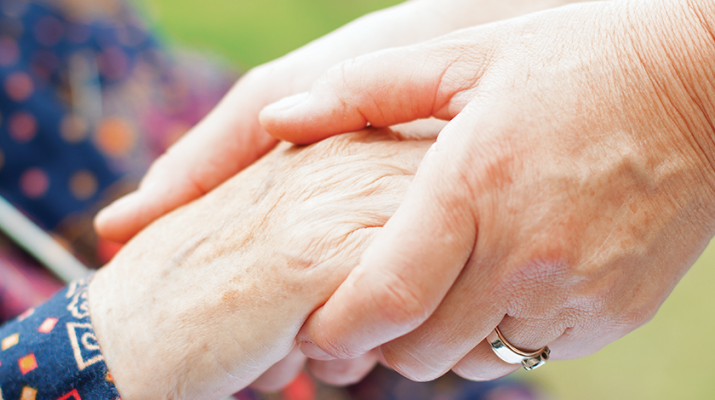List for caregivers emphasizes compassion for patient
By Barbara Pierce
There are few things that scare me more than getting dementia. It’s a terrible disease.
Dementia is the term for a group of symptoms: memory loss, impaired thinking, and loss of reasoning.
Alzheimer’s disease is the most common cause of dementia.
If I get dementia, I’d like my caregiver to follow the list of rules created by dementia expert Rachael Wonderlin, online at Alzheimer’s Reading Room.com.
Chris Vitale, owner-operator of The Terrace at Woodland in Rome, reviewed the list. The Terrace is a family owned and operated 60-bed assisted living community with a 12-bed memory care neighborhood.
Vitale agrees this list provides a good guide for caring for a person with dementia.
— “If I get dementia, I want those around me to embrace my reality. If I say I’m waiting for my husband to come home for dinner and he’s been dead for 10 years, or I’m planning to visit my parents, let me believe those things and I’ll be much happier,” Vitale said. “Join in the journey with the person. Don’t provide reality orientation for them. If you tell a widow her husband won’t be coming home because he’s dead, it’s like she’s hearing it for the first time. She doesn’t need to hear it.”
— “If I get dementia, I don’t want to be treated like a child. Talk to me like the adult that I am. And don’t talk about me like I’m not in the room.”
— “If I get dementia, treat me the way that you would want to be treated.”
— “If I get dementia, I still want to enjoy the things that I’ve always enjoyed. Help me find a way to exercise, read, and visit with friends.”
“It’s important to stay busy, at any age,” Vitale commented. “In our memory care neighborhood, we have activities, not only to engage our residents, but also to provide purpose.”
“We have a kitchen like the kitchen they grew up with, with a stove, refrigerator and a dishwasher. Residents help with preparing food, baking, setting the table, or cleaning up after a meal. If they wish to join in these activities, we encourage them.”
— “If I get dementia, don’t act frustrated when I mix up names, events or places. It’s not my fault.”
— “If I get dementia, and become agitated, take the time to figure out what’s bothering me.”
“All you do when you say ‘no’ to a person with dementia is agitate them further,” Vitale added. At The Terrace, the doors from the memory care unit are locked. However, if a resident tries to go out, a staff person joins him, lets him out and walks with him.
Vitale is proud of his staff that is specially trained in the challenges of caring for persons with dementia. “Also, a 12-bed unit means our ratio of care is high; we have two caregivers for 12 residents. Residents get consistent care from the same caregiver.”
— “If I get dementia, don’t exclude me from parties and family gatherings. Everyone needs to feel part of a group,” commented Vitale. “We include our memory care residents in the morning exercise and our afternoon crafts, and our weekly music program.”
Don’t forget to visit
— “If I get dementia, and live in an assisted living facility, please visit me often. It’s important for families to stay involved,” added Vitale. “Those with involved families have a happier life.” You can check out sites like www.summerfieldencinitasmc.com/memory-care/ to get an idea.
— “If I get dementia, don’t feel guilty if you can’t care for me 24/7. It’s not your fault; you’ve done your best. Find someone to help you, or choose a place for me to live.”
“Families often feel guilty when they place their loved one,” Vitale said.
“I can no longer cope with my husband at home; he cannot do anything for himself,” said one wife online. “I think residential care would be better for him as l feel it’s a strain on him trying to fit into normal life. But I feel so guilty.”
When caring for a person with dementia at home becomes dangerous or nearly impossible, it’s absolutely necessary to move them to a place like gardensofmodesto.com/living-options/#memory-care where they can get the care they need. Though this is the best decision for them and for you, the guilt and sadness can still be overwhelming.
It doesn’t mean you’ve failed them. It means you’re making a smart decision to get them the care they need. Spend time with them, frequently talk with staff, and you are taking good care of your loved one.
“The new resident will feel overwhelmed, scared and anxious in a new place,” said Vitale. “This is mitigated by our staff, trained to make all feel comfortable. It generally takes two, three or four weeks for a new resident to relax, feel comfortable and get in the routine.”
— The last rule: “If I get dementia, remember that I am still the person you know and love.”
For more information on The Terrace at Woodland, call 315-336-0307, or see terraceatwoodland.com.

